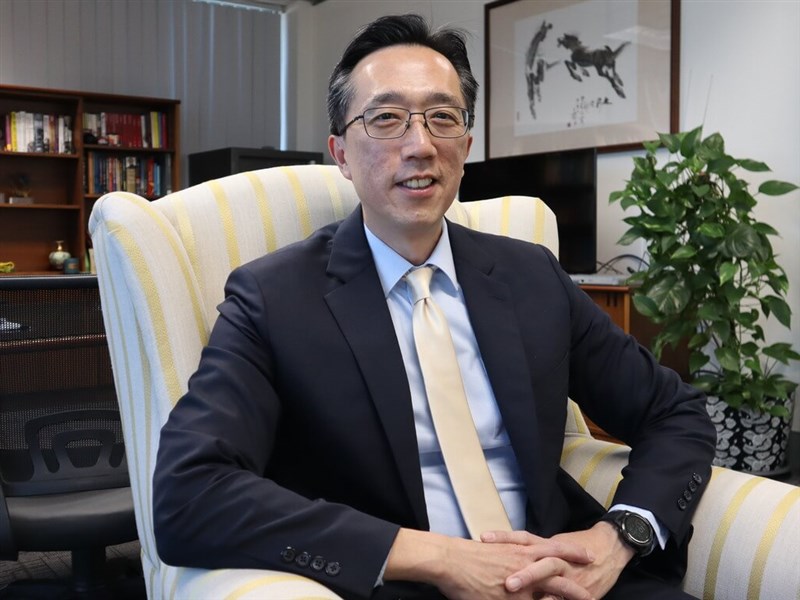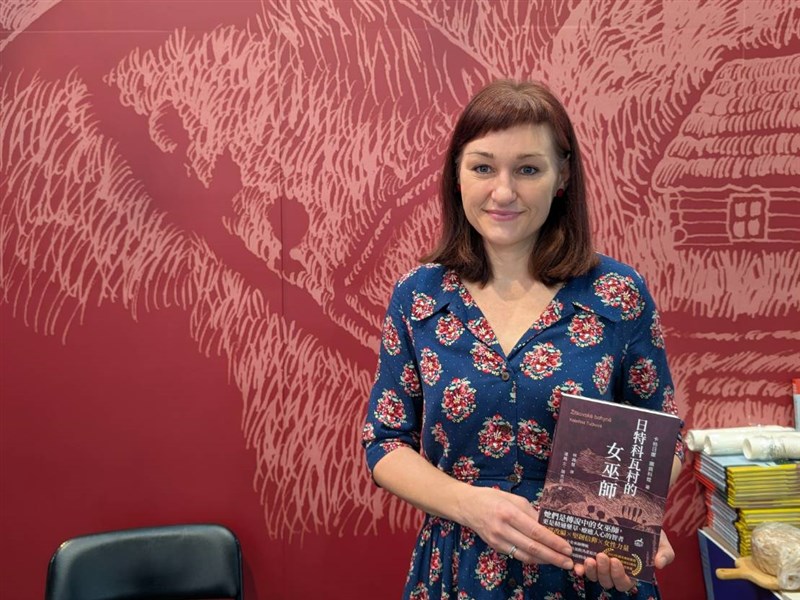INTERVIEW / Taiwan-India space partnership builds on complementary strengths: ITRI
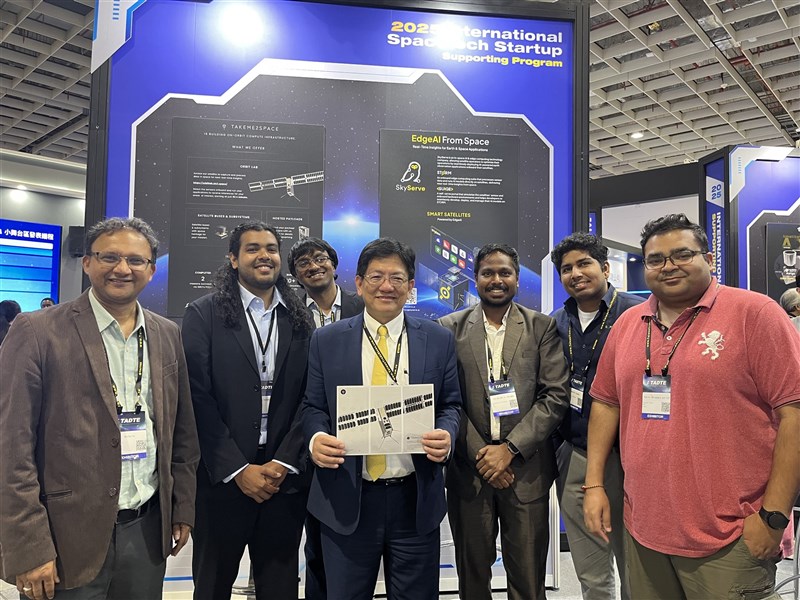
Taipei, Sept. 20 (CNA) The space industries in Taiwan and India can "complement each other," according to the Industrial Technology Research Institute (ITRI), a key player promoting space-sector collaboration between the two countries.
That message was showcased at the Taipei Aerospace & Defense Technology Exhibition 2025 (TADTE), which entered its final day Saturday, when five Indian space start-ups continued to attract attention from local attendees.
It was a rare sight at the biennial event, where most of the hundreds of exhibitors were from Taiwan, the United States and Europe.
Indian space enterprises were participating "as a team at scale" for the first time, Lewis Chen (陳立偉), general director of ITRI's Commercialization and Industry Service Center, told CNA on Friday.
The government-backed ITRI has invited a total of 18 Indian space start-ups to Taiwan for exchanges between 2023 and 2025, including the five exhibiting at TADTE 2025, Chen said.
As of Friday, at least 12 MOUs had been signed between Taiwanese companies and Indian space start-ups since 2023, including two at the show, focusing on areas such as small satellites, launch vehicles and artificial intelligence (AI) space applications, he said.
In reality, a number of the MOUs essentially featured Taiwanese companies seeking to make use of Indian launch services, but Chen said they were even more basic than that.
"The first type [of MOUs] is about working out how we can work with you, how we fit together, and how we move forward so we complement each other," Chen said.
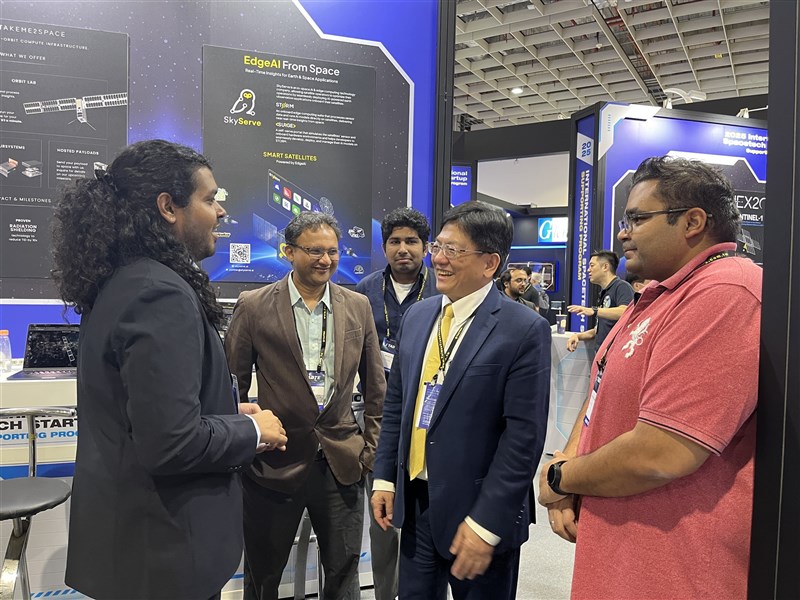
For example, Hex20, an Indian start-up focused on small-satellite platforms, signed an MOU with TaiCrystal International Technology Co., Ltd., a Taiwanese company specializing in space power chips, to test solar-cell applications on one of Hex20's satellites scheduled for launch.
The two companies will work together to collect relevant data on an upcoming mission to improve their products and expand commercial opportunities in space, according to Chen.
Supply chains
In the future, more cooperation may be seen across supply chains, Chen suggested.
"Taiwan has a comprehensive supply chain in semiconductors, communication modules, and radio-frequency components," Chen said.
With that solid hardware base provided by Taiwanese vendors, Indian space companies -- strong in later-stage process such as launch services and integrated applications -- can pursue cost efficiency and faster product iteration, Chen said.
"We're stronger in foundational industries," Chen said, noting that over 95 percent of Taiwan's space-tech revenue comes from ground communications equipment, which is related to Information and Communication Technology (ICT).
"India, by contrast, derives about 75 percent of its [space-tech] revenue from applications. That marks a big difference," said Chen, who recently returned from a visit to India to discuss space and other topics with local enterprises.
In recent years, India's space industry has grown quickly with strong government support.
Milestones include Chandrayaan-3's lunar south-pole landing by the Indian Space Research Organisation (ISRO), which made the South Asian country the fourth in the world to soft-land unmanned probes or landers on the Moon.
The country's application-led space market is also active, with advances from start-ups such as Agnikul Cosmos, which developed the world's first single-piece 3D-printed rocket engine and successfully launched it in 2024.
Invited to this year's TADTE, SLP Pillai, Agnikul Cosmos's executive lead in operations, told CNA that the company can now 3D-print a rocket engine within 72 hours, and said their aim at the expo was to "explore the vendor ecosystem available in Taiwan."
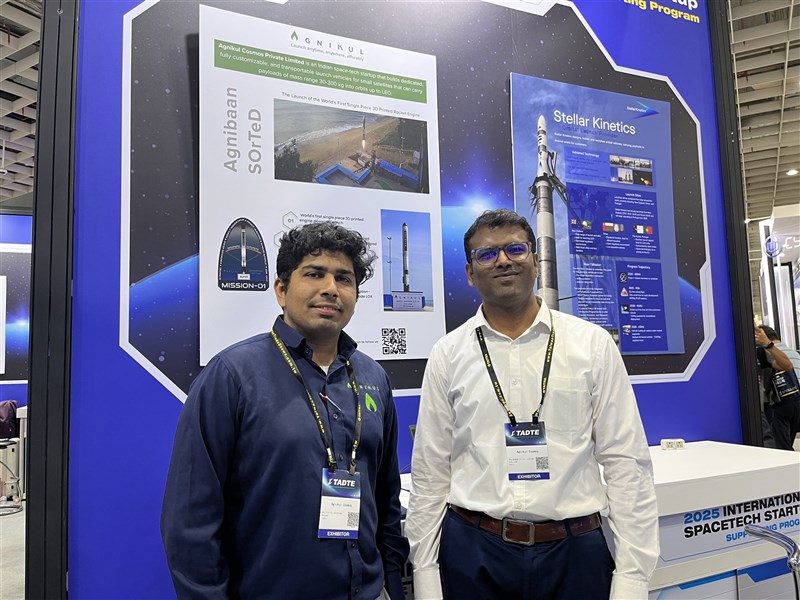
Challenges
In terms of challenges in Taiwan-India space exchanges, Chen said some Indian space start-ups find that their plans stall in Taiwan because the space-industry regulatory framework is still under development.
While India has an orbital-class spaceport and is building another specifically for small-satellite launches, Taiwan currently has only one launch site for academic and research use, and building an orbital facility elsewhere is likely to face environmental restrictions.
Asked if Taiwan is falling behind, he said Taiwan and India are on different paths.
Taiwan's more deliberate pace means it prioritizes a solid hardware base and, as a result, has strong integration capabilities, while India's faster pace has, after many launches, pushed down launch costs and expanded the range of services, according to Chen.
"That actually works out well. If we are the same, we compete; since we are different, we coordinate and co-work," he said.
-
![Taiwan's top envoy to Australia seeks cooperation on minerals, drones]() Taiwan's top envoy to Australia seeks cooperation on minerals, dronesAs Australia looks to recalibrate its economic relationship with China, Taipei is hoping to strengthen bilateral ties and partner with Canberra in such areas as critical minerals and drones, said Douglas Hsu (徐佑典), Taiwan's representative to Australia.02/26/2026 11:16 AM
Taiwan's top envoy to Australia seeks cooperation on minerals, dronesAs Australia looks to recalibrate its economic relationship with China, Taipei is hoping to strengthen bilateral ties and partner with Canberra in such areas as critical minerals and drones, said Douglas Hsu (徐佑典), Taiwan's representative to Australia.02/26/2026 11:16 AM -
![Czech author reflects on cultural erasure under authoritarian rule]() Czech author reflects on cultural erasure under authoritarian ruleWhen best-selling Czech author Kateřina Tučková was in Taiwan earlier this month to promote the Chinese version of her novel "The Last Goddess," she said she felt the story would resonate with Taiwanese readers because of a common authoritarian past.02/22/2026 04:35 PM
Czech author reflects on cultural erasure under authoritarian ruleWhen best-selling Czech author Kateřina Tučková was in Taiwan earlier this month to promote the Chinese version of her novel "The Last Goddess," she said she felt the story would resonate with Taiwanese readers because of a common authoritarian past.02/22/2026 04:35 PM -
![Director Tsou Shih-ching challenges gender norms in 'Left-Handed Girl']() Director Tsou Shih-ching challenges gender norms in 'Left-Handed Girl'Superstitions passed down through generations can shape people's lives in subtle yet lasting ways. In her debut solo feature film "Left-Handed Girl" (左撇子女孩), director Tsou Shih-ching (鄒時擎) uses one such belief to examine gender roles and social expectations imposed on women in Taiwanese society.02/22/2026 11:04 AM
Director Tsou Shih-ching challenges gender norms in 'Left-Handed Girl'Superstitions passed down through generations can shape people's lives in subtle yet lasting ways. In her debut solo feature film "Left-Handed Girl" (左撇子女孩), director Tsou Shih-ching (鄒時擎) uses one such belief to examine gender roles and social expectations imposed on women in Taiwanese society.02/22/2026 11:04 AM
-
Politics
Two Taiwanese stranded in Israel amid conflict reach Jordan
03/02/2026 09:02 PM -
Business
124,000 Taiwanese have at least NT$100 million in assets: Report
03/02/2026 08:53 PM -
Society
Rain, cooler weather expected across Taiwan on Lantern Festival
03/02/2026 08:13 PM -
Society
Iran conflict to 'severely' delay Taiwan mail to 17 countries
03/02/2026 06:32 PM -
Cross-Strait
Iran could cloud Trump-Xi talks but unlikely to spark Taiwan war: Scholars
03/02/2026 06:13 PM
